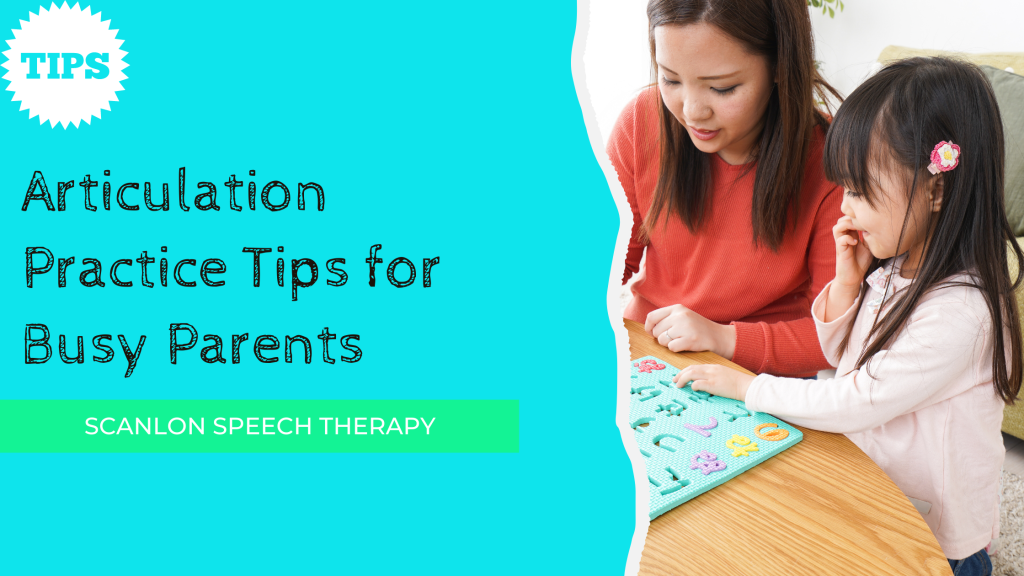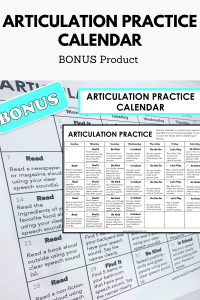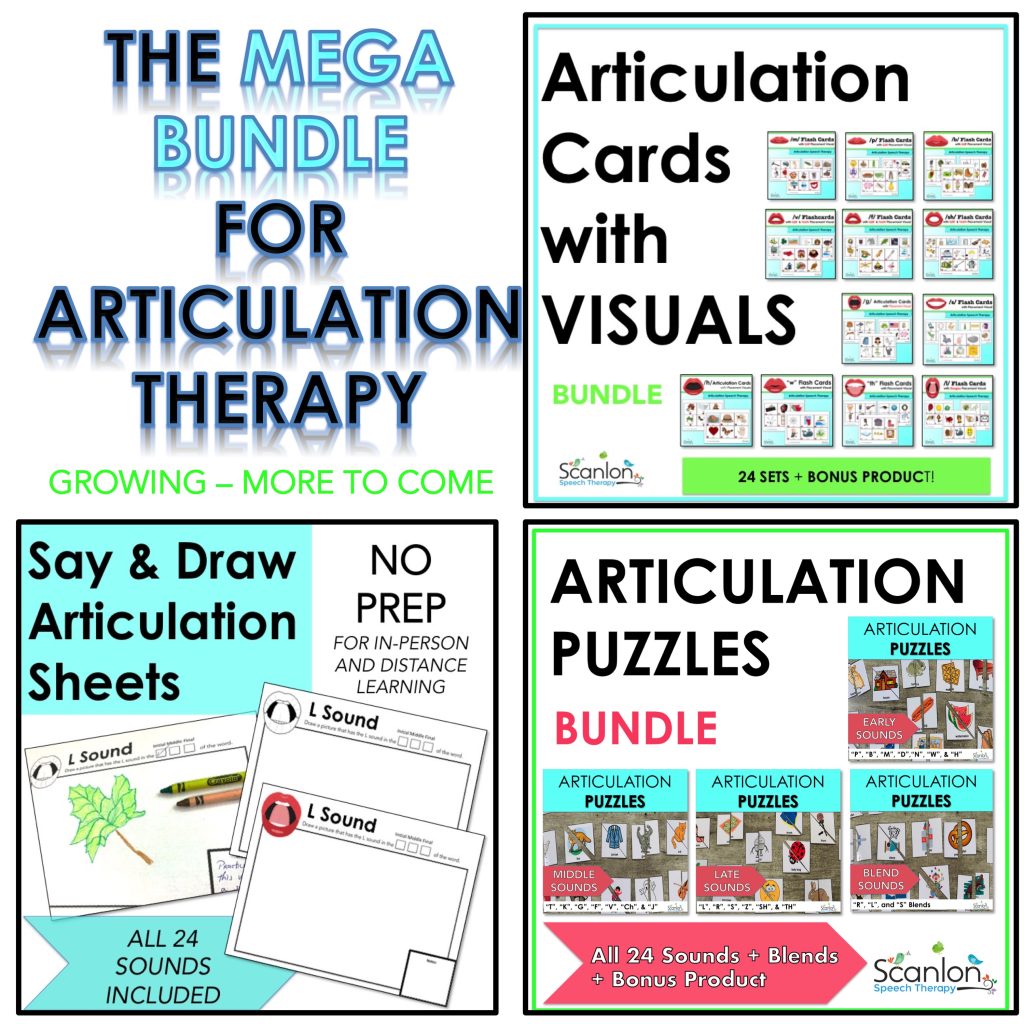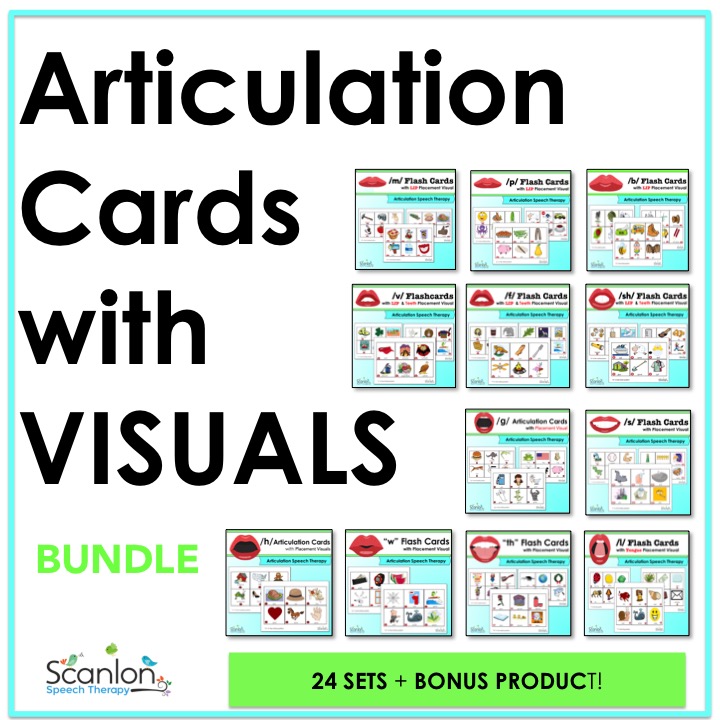Sign Up For Our E-Blast To Receive Information on our Books, Speech Therapy materials and our latest freebies!
Articulation Practice for Busy Parents – Tips and Ideas

In a society of chronically over-booked children and stressed out adults, finding time to practice newly acquired articulation skills can be challenging.
However, practicing new skills is necessary for mastery.
For speech skills to generalize, our children need to practice in different settings and with various communication partners.
This does not mean that the responsibility is entirely on the parents, caregivers, or the child.
We, the speech language pathologists (SLPs), are responsible for encouraging our students or clients to practice outside of the therapy room. Gray and Shelton (1992) assert that SLPs should spend “specific attention during treatment” ensuring that our students practice at home (p. 334).
How can we encourage our students and clients to practice?
Finding time to practice articulation at home must be something that is easy, functional, and motivating for children and their parents or caregivers.
Discovering what works best for home practice often entails implementation of a client or family-centered approach.
We only have so much time, energy and even materials to dedicate to practicing so understanding an individual or families’ preferred way to practice is essential for carryover.
Begin by asking some of the following questions:
- Do you practice saying your sounds at home?
- How do you practice?
- Do you like to practice?
- What is your favorite way to practice?
- Where do you like to practice?
- Who practices with you?
These questions will assist in devising an effective home program.
They may also increase your children/client/students’ awareness of the importance of practice – particularly outside of the therapy room.
Other tips for success:
- Keep practice sessions short and sweet – 5 to 10 minutes is fine
- Eliminate distractions
- Aim for many trials of the targeted sound
- Ask your child’s speech therapist for specific articulation placement tips, if needed, so you can elicit and praise correct productions
This articulation practice calendar is included in my Mega Articulation Bundle (a bonus) and motivates children to practice at home!
Is it okay for my child to make errors while practicing his sound?
- Recent research performed by Matthews et al (2021) concluded that a certain amount of error during practice might foster carryover and retention of speech production learning to unpracticed speech material and beyond the speech room. More research is needed to determine the ideal level of error that leads to better maintenance and retention of speech skills. However, this is interesting nonetheless!
The following are some easy, fun, and functional ways to practice speech sounds at home. Go through these suggestions with your student or client to learn what excites and motivates them and determine what is realistic for their family. Choose those that suit your child’s interests, abilities, and family dynamic.
For practice at the word level:
- Scavenger Hunt – find 5 to 10 items that have the target sound
- Play “I spy” while looking for items that have the target sound
- Read the comics and see if he or she can find words with his or her target sound.
- Play 20 Questions. Think of a word or object that the targeted sound. Have the child ask questions to figure out what the object is. If that is too difficult, give the child clues and have him guess.
- Hold a yoga pose and say your target sound. These Yoga Flashcards are super fun to use when practicing sounds and are perfect for the child who likes to move and groove.
- Spelling, Reading, or Vocabulary Word Search – Search your child’s spelling, reading, or vocabulary list (or other materials from their school work) for words that have his or her sound in. Highlight them and then say them aloud.
Practice at the sentence level:
- Silly Sentences – See who can make up the silliest sentence using one of your child’s speech words.
- Challenge Sentences – See who can make up the sentence using the most words containing the speech sound.
- Tongue Twisters – Do you know a tongue twister that has your child’s speech sound? If not, make some up!
Carryover Practice:
- For beginning readers, have child read from his or her reading book or storybooks he enjoys. Try using poems, the Sunday Funnies, Comic Books, cereal boxes, signs, video or board game instructions; anything your child enjoys reading.
- Have your child practice using his target sound while telling a personal narrative or retelling a story or something about his day.
- As noted before, families are busy running around. Therefore, encourage clients to practice their target sounds and to embed strategies into their daily routines. This can be done while in the car, standing in line at the grocery store, and sitting in a waiting room. Give suggestions on how to cleverly infuse techniques or targets into your daily routine, but better yet, ask your clients how they can do it. They will feel empowered and may be more likely to practice if they chose how and when to do it.
- Make a phone call using good speech.
- Use good speech during supper.
- Use good speech in the car on the way to practice, lessons, or school.
Other general activities that your child or student may enjoy:
Board Games
- Board games can be used to target any speech therapy goal! They are especially helpful in teaching a child to appropriately take turns, ask and respond to questions, and follow directions. Some of my favorite board games include: Jumpin’ Monkeys, Fryin’ Flying Donuts, Sneaky Snacky Squirrel, Zingo, Guess Who, Build or Boom or any favorite board game. Write a list of words containing the target sound and intentionally say them when playing.
- Amazon affiliate links included.
Books
- Use books target any speech and language goal, too. Last week, I asked one client to read, The Foot Book by Dr. Seuss to practice the “f” sound. Read books loaded with your child’s target sound.
- Although I do NOT recommend using flashcards as a means to facilitate language in language delayed children, I do use flashcards in a fun way to practice speech sounds. For inspiration on how to use flashcards, please read, 17 Fun Ways to Use Articulation Flashcards to Get Multiple Repetitions.
- Yes, sometimes I give worksheets! And, my clients love them! I have a private practice and in my setting, I have highly motivated parents who want to do something or anything to help their children. I find that they appreciate leaving therapy with something tangible that enables them to easily practice while seated at a table. The trick is to select enjoyable, interactive worksheets. You can find an endless variety on teacherspayteachers.
Do you have any good ideas?
If so, please do not hesitate to share!
References:
Gray, S.I. & Shelton, R.L. (1992). Self-monitoring effects of articulation carryover in school-age children. Language, Speech, and Hearing Services in Schools, 23, 334-342.
Matthews, T., Barbeau-Morrison, A., & Rvachew, S. (2021). Application of the challenge framework during treatment of speech sound disorders. Journal of Speech, Language, and Hearing Research, 64, 3769-3785.
- Enhance Your Speech Therapy Sessions with ‘Picky Kitty’ – A Must-Have Game for Every Speech Therapist
- Same and Different: Why Speech Therapists and Educators Should Target this Basic Concept
- New Beginnings for Scanlon Speech Therapy
- Articulation Speech Therapy: Favorite Activities, Games, and Books to Target the TH Sounds
- Articulation Speech Therapy: Favorite Activities, Games and Books to Target the L Sound




